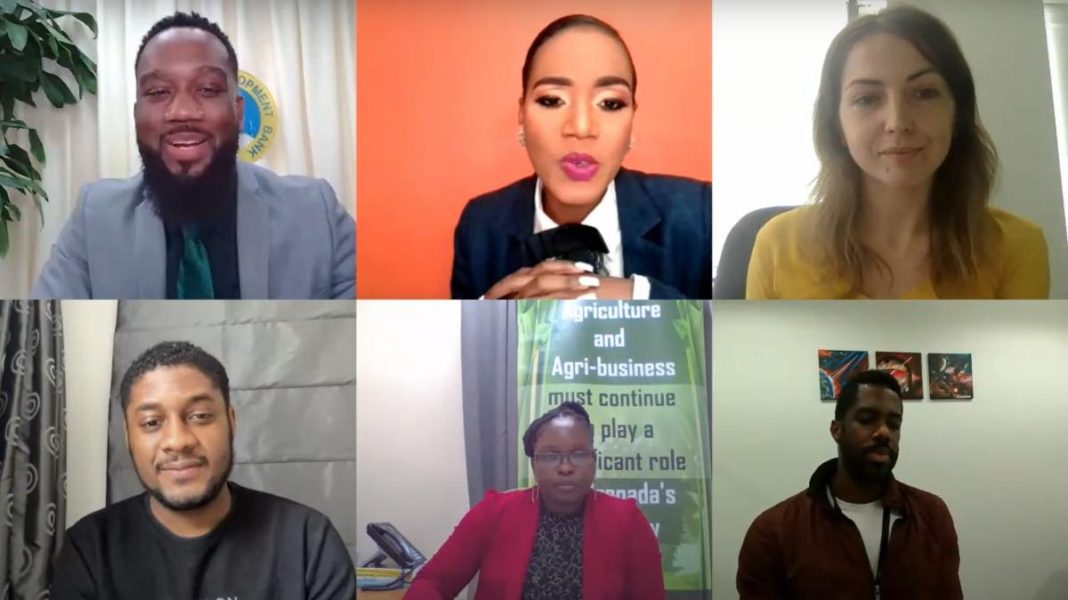Be bold. Don’t fear failure. Think differently about education.
These were some of the key messages coming from the panel of young global and regional innovators and entrepreneurs in the final seminar of the Caribbean Development Bank’s recently ended 51st Annual Meeting of its Board of Governors.
The seminar, ‘Listen, Learn, Live: Youth Insights on Innovation Imperatives and Investments’ was hosted by Barbadian Raphael Saul and Jamaican Dr Terri-Karelle Reid. In addition to the panel discussion, the seminar featured Grenadian Brandon Brathwaite, the winner of CDB’s youth spoken word contest, as well as a powerful recorded call to action, from young leaders around the Region, calling for public policy that promotes innovation, resilience and inclusive sustainable development.
In the discussion, panellists homed in on the actions and thinking needed in the Caribbean to advance innovation, with a major point of discussion being how the education system can assist in developing innovators.
Canadian entrepreneur Greta Cutulenco, Chief Executive Officer and co-founder of technology company Acerta highlighted the utility of embedding entrepreneurship lessons as part of a formal curriculum.
“Something I found was done well in some of my institutions was merging a typical curriculum with this focus on entrepreneurship – getting folks familiar with what it means to start a business, getting that mindset of driving to do something innovative and not being afraid of it and also the mindset of failure,” she stated.
Barbados-born and raised technology entrepreneur Carlton Cummins, stated that while he found that in the Caribbean “we punch above our weight when it comes to the education system based on the actual amount of money we have to contribute”, more needs to be done to encourage critical thinking.
Cummins, the co-founder and Chief Technology Officer of United Kingdom-based battery storage company Aceleron Limited pointed out that this ability was especially valuable considering the fast pace of change in certain industries.
“We do a lot of education on how to learn – how to take information in, how to absorb it. One of the things I think we need to do improvement on is how to think. The concept of how to figure out stuff on your own. Especially in this market – the technology industry, it is very hard to teach someone the skills that will be specifically adequate in the next ten years. But the concepts by which these things work – if you understand the thinking and the logic behind it, you will always have a value. That comes about from knowing how to think, not knowing how to learn,” stated Cummins.
To that end, stated Grenadian agropreneur Bevon Chadel Charles, Chief Executive Officer and founder of Akata Farms, called for a rethink of the role of the education sector, querying:
“For what purpose is something being taught? Are we just trying to build people for the world of work? I don’t think we’re building enough innovators. So, then we have to change our methodology of how we are going to approach learning.”
Creating an enabling environment for innovation also has to be underpinned with tangible actions and support from those in positions of power in government and business, stressed Trinidadian Kyle Maloney, founder of Tech Beach Retreat.
“There is a generation that has grown up largely with technology and they are bursting and excited to try new things but there is a layer on the top that is the status quo and unfortunately there is that disconnect which exists, where in many cases lip service is paid versus actual action,” observed Maloney, adding:
“On the rare occasion you find that person on the top layer that is really a driver and is trying to immerse themselves within the digital transformation space but unfortunately there is only so much someone can do. We’re not seeing that sort of catalytic effect happening yet whereby we’re seeing investments going into amazing technology companies or we’re seeing major things happening in the larger companies driving technology and innovation. We’re seeing it very separate and dispersed.”
Expanding on the topic of actions to support innovation, Cummins called for a focus on “the less sexy stuff”, listing several practical challenges which entrepreneurs in the Region face.
“The administrative processes need to be a lot more in tune with where the market is globally. It should be faster to set up bank accounts. It should be a lot easier to do imports and exports. Our logistics processes need to improve. These are not things that have anything to do with the entrepreneurs directly but indirectly it has a significant impact on how you can actually engage and play on the global scale,” he stated.



